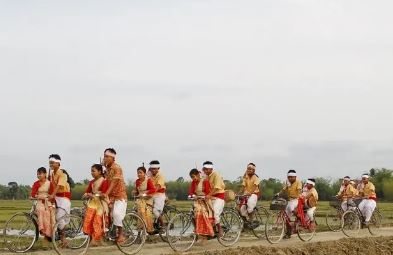Article 244(A) and Autonomy Issue in Assam
In the tribal-majority Diphu Lok Sabha constituency of Assam, which went to polls on April 26, 2024, the implementation of Article 244(A) of the Indian Constitution has emerged as a key election promise by candidates across all political parties. This constitutional provision allows for the creation of an autonomous state within Assam, granting greater autonomy to tribal areas.
Diphu Constituency Profile
Diphu, reserved for Scheduled Tribes (STs), is the most sparsely populated among Assam’s 14 Lok Sabha seats, with just 8.9 lakh voters. It covers six Assembly segments across three tribal-majority hill districts:
- Karbi Anglong
- West Karbi Anglong
- Dima Hasao
These districts are governed under the Sixth Schedule of the Constitution and fall under two autonomous councils – the Karbi Anglong Autonomous Council (KAAC) and the North Cachar Hills Autonomous Council. The constituency is home to diverse communities, including Karbi, Dimasa, Hmar, Kuki, Rengma Naga, Zeme Naga, Bodo, Garo, Assamese, and Gorkha, among others.
About Article 244(A)
- Inserted by the 22nd Amendment Act, 1969.
- Empowers Parliament to form an autonomous state within Assam for certain tribal areas.
- Allows for a separate legislature, council of ministers, and greater autonomy over law and order.
- The demand for autonomy in Assam’s hill areas like Karbi Anglong dates back to the 1950s.
- Several militant groups signed peace accords with the government for implementing Article 244(A).
- A central issue in the Diphu Lok Sabha constituency of Assam.
Key features include:
- Provision for a separate Legislature or Council of Ministers, or both
- Goes beyond the limited powers granted to autonomous councils under the Sixth Schedule
- Allows for greater control over law and order and financial matters
History of the Autonomy Demand
- The demand for autonomy in Assam’s hill areas dates back to the 1950s, with a movement seeking a separate hill state. While this led to the creation of Meghalaya in 1972, leaders in Karbi Anglong chose to stay with Assam, relying on the promise of Article 244(A).
- The Autonomous State Demand Committee (ASDC), formed to advocate for regional autonomy, played a crucial role in negotiating a Memorandum of Settlement in 1995 with the state and central governments. This agreement aimed to enhance the powers of the two autonomous councils in the region.
- However, as autonomy remained elusive, the demand for Article 244(A) also took the form of an armed insurgency. The governments in Delhi and Guwahati have signed several peace accords with militant groups, including the Karbi and Dimasa factions.
- In 2021, a peace settlement was reached with five militant groups in Karbi Anglong, promising greater autonomy and a special development package. A similar agreement was signed with the Dimasa National Liberation Army in 2023.
Despite the peace settlements, the implementation of Article 244(A) remains a central issue in the Diphu constituency. All candidates have promised to work towards realizing this constitutional provision, which has been a demand of the tribal communities in the region.
Month: Current Affairs - April, 2024
Category: Legal & Constitution Current Affairs







